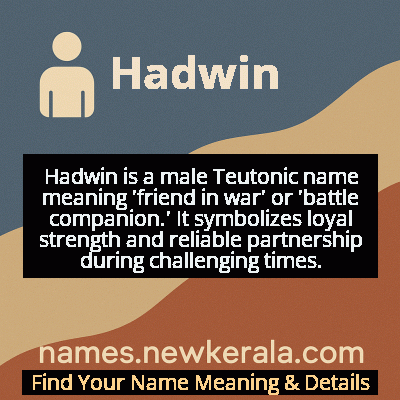Hadwin Name Meaning & Details
Origin, Popularity, Numerology Analysis & Name Meaning of Hadwin
Discover the origin, meaning, and cultural significance of the name HADWIN. Delve into its historical roots and explore the lasting impact it has had on communities and traditions.
Name
Hadwin
Gender
Male
Origin
Teutonic
Lucky Number
5
Meaning of the Name - Hadwin
Hadwin is a male Teutonic name meaning 'friend in war' or 'battle companion.' It symbolizes loyal strength and reliable partnership during challenging times.
Hadwin - Complete Numerology Analysis
Your Numerology Number
Based on Pythagorean Numerology System
Ruling Planet
Mercury
Positive Nature
Adventurous, dynamic, curious, and social.
Negative Traits
Restless, impatient, inconsistent, prone to indulgence.
Lucky Colours
Green, white.
Lucky Days
Wednesday.
Lucky Stones
Emerald.
Harmony Numbers
1, 3, 9.
Best Suited Professions
Sales, marketing, travel, entertainment.
What People Like About You
Versatility, charisma, adventurous spirit.
Famous People Named Hadwin
Hadwin of Lindisfarne
Religious Figure
Bishop of Lindisfarne who helped preserve Christian traditions during Viking invasions
Hadwin Fitzwilliam
Military Commander
Norman knight who served under Henry I and established several fortified settlements in northern England
John Hadwin
Explorer
Member of Martin Frobisher's expeditions to the New World, known for his navigation skills
Thomas Hadwin
Architect
Designed several notable Georgian buildings in Yorkshire that still stand today
Name Variations & International Equivalents
Click on blue names to explore their detailed meanings. Gray names with will be available soon.
Cultural & Historical Significance
Throughout history, the name Hadwin maintained its association with strength, loyalty, and martial prowess. During the Norman Conquest and subsequent medieval periods, bearers of the name often served as knights, military commanders, or administrators in border regions where strong leadership was essential. The name's persistence through centuries, though never extremely common, demonstrates its enduring appeal as a symbol of reliable strength and steadfast companionship in challenging circumstances. Its Teutonic origins connect it to a broader European warrior tradition that valued both martial skill and loyal friendship.
Extended Personality Analysis
Individuals named Hadwin are typically perceived as strong, reliable, and fiercely loyal companions. They often possess a natural leadership quality combined with a protective instinct toward those they care about, embodying the name's original meaning of being a 'friend in battle.' Hadwins tend to be practical problem-solvers who remain calm under pressure, making them valuable in crisis situations where steady judgment is required. Their strength is often tempered with a deep sense of responsibility and commitment to their principles.
In social settings, Hadwins are usually reserved but form deep, lasting friendships with those who earn their trust. They value honesty and direct communication, often preferring action over words. While they can be traditional in their outlook, they're also adaptable when circumstances demand change. The warrior heritage of the name often manifests not as aggression, but as determination and resilience in facing life's challenges. Hadwins typically excel in roles that require both strength of character and the ability to work collaboratively toward common goals.
Modern Usage & Popularity
In contemporary times, Hadwin remains a relatively uncommon but distinguished choice for boys, particularly among families with English or Germanic heritage who appreciate historical names with strong meanings. The name has seen a slight resurgence in recent years as part of the trend toward vintage and meaningful names, though it remains outside the top 1000 names in most English-speaking countries. It's particularly popular in the United Kingdom, Canada, and Australia, where its old-world charm appeals to parents seeking a name that is both traditional and distinctive. Modern Hadwins often go by nicknames like 'Haddie' or 'Win' in casual settings, while the full name is typically used in formal contexts.
Symbolic & Spiritual Meanings
Symbolically, Hadwin represents the ideal of loyal strength and reliable companionship in challenging times. The name embodies the concept of being a steadfast ally when facing adversity, making it symbolic of resilience, protection, and unwavering support. Metaphorically, it suggests someone who stands by others through life's battles, whether literal or figurative. The combination of martial strength ('battle') with relational commitment ('friend') creates a powerful symbolic meaning of balanced strength—power used for protection and support rather than aggression. This makes the name emblematic of noble leadership and the kind of strength that serves others.

